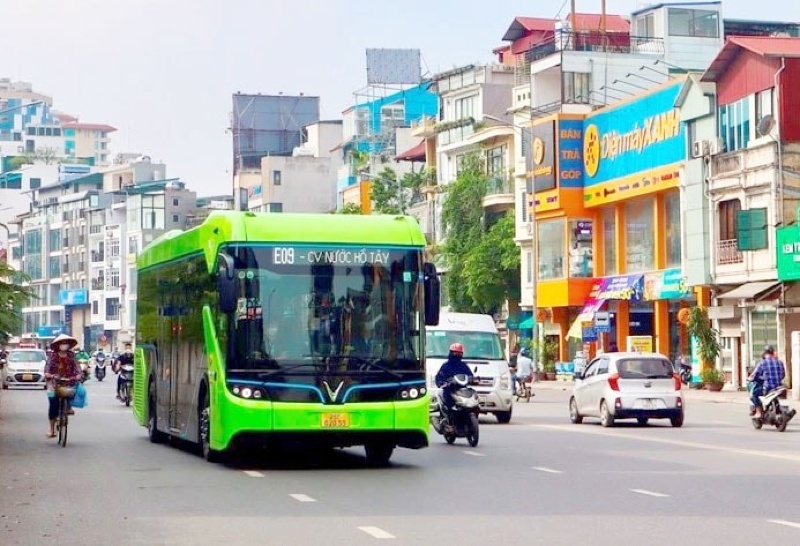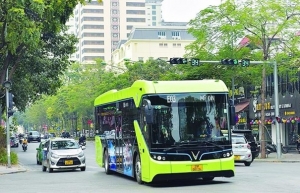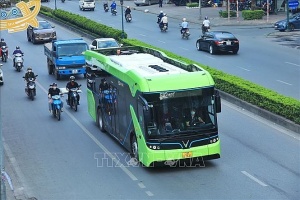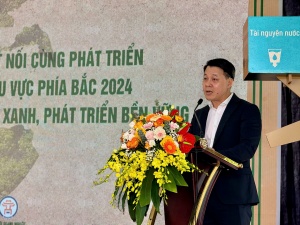Hanoi bus system to be fully green by 2035
Hanoi People's Committee has approved the scheme for developing public transport bus systems using electric and green energy within the city.
The scheme aims to outline a plan and roadmap for transitioning to and developing electric and green energy buses in the city, following a roadmap approved in 2022. The proposal suggests solutions for transitioning and developing to achieve 100 per cent electric and green energy bus vehicles by 2035.
Hoang Duong Tung, president of the Clean Air Network and former deputy director-general of the Vietnam Environmental Administration, said, "With this goal, I believe this journey is not a distant future, but is ongoing and needs to happen as soon as possible. Moreover, according to the newly enacted capital law, in low-emission areas, there will be zones restricting pollution caused by motorcycles and cars. Alongside public awareness, transitioning to green buses is a must."
 |
| Photo: baodautu.vn |
According to the transition plan, in early 2025, four transport units - Hanoi Transport Corporation, Newway Transport, Hai Van International Transport, and Bao Yen Construction Services - will pilot the operation of five electric bus routes with 76 vehicles. The pilot aim is to establish standards and pricing for medium and small electric buses.
For bus routes expiring in 2025, the city plans to replace large depreciated diesel engines with large electric buses, starting with route 34 with a total of 27 buses. Thus, in 2025, the total number of converted vehicles is expected to reach 103, representing 5 per cent of vehicles requiring conversion.
From 2026, economic and technical standards and pricing for electric buses are expected to be fully issued by the city. Transport units will replace vehicles that have reached the end of their 10-year depreciation period on each route, considering operational indicators and the range of electric bus types available in the market. During the 2026-2030 period, the total number of vehicles expected to be converted is over 1,800, raising the proportion of electric and green energy vehicles to 93.4 per cent.
From 2031 to 2035, the city will continue to convert an additional 238 vehicles, completing the goal of achieving 100 per cent electric and green energy vehicles by 2035.
The total implementation budget will see Hanoi's budget contributing around $1.42 million, and the remainder to be raised by enterprises.
At the end of 2021, the Department of Transport introduced the country's first three electric bus routes. By the end of 2023, the city had 10 electric bus routes. The total number of clean energy bus routes is 20, including 10 electric routes and 10 CNG natural gas routes.
Monitoring and evaluation of electric bus routes over the past three years have shown comprehensive effectiveness. Economically, the introduction of electric bus routes has been widely supported by the public and passengers. During peak hours, passenger capacity exceeds 100 per cent.
 | Hanoi takes moves to develop green transportation Following global trends on green transportation, the capital city of Hanoi has been striving to develop a green transport system. |
 | Hanoi approves ambitious green bus plan Hanoi People’s Council approved a plan to develop public transport by using electric buses and green energy on July 4. |
 | Hanoi sets dual path through green and digital transformation Green and digital transformation are becoming dual drivers of growth for Hanoi, paving the way for the city’s modern and sustainable development. |
What the stars mean:
★ Poor ★ ★ Promising ★★★ Good ★★★★ Very good ★★★★★ Exceptional
Related Contents
Latest News
More News
- $100 million initiative launched to protect forests and boost rural incomes (January 30, 2026 | 15:18)
- Trung Nam-Sideros River consortium wins bid for LNG venture (January 30, 2026 | 11:16)
- Vietnam moves towards market-based fuel management with E10 rollout (January 30, 2026 | 11:10)
- Envision Energy, REE Group partner on 128MW wind projects (January 30, 2026 | 10:58)
- Vingroup consults on carbon credits for electric vehicle charging network (January 28, 2026 | 11:04)
- Bac Ai Pumped Storage Hydropower Plant to enter peak construction phase (January 27, 2026 | 08:00)
- ASEAN could scale up sustainable aviation fuel by 2050 (January 24, 2026 | 10:19)
- 64,000 hectares of sea allocated for offshore wind surveys (January 22, 2026 | 20:23)
- EVN secures financing for Quang Trach II LNG power plant (January 17, 2026 | 15:55)
- PC1 teams up with DENZAI on regional wind projects (January 16, 2026 | 21:18)

 Tag:
Tag:




















 Mobile Version
Mobile Version